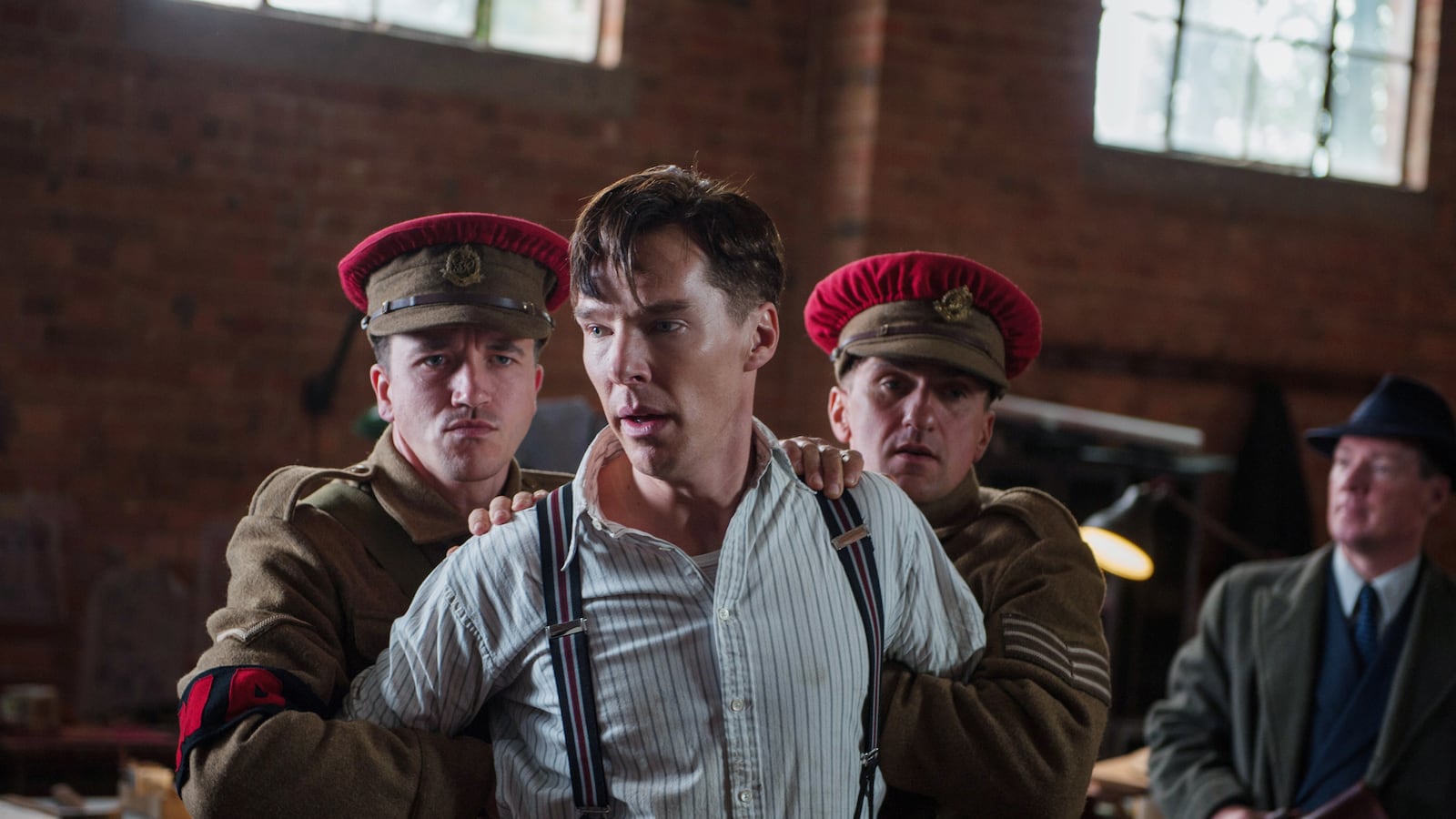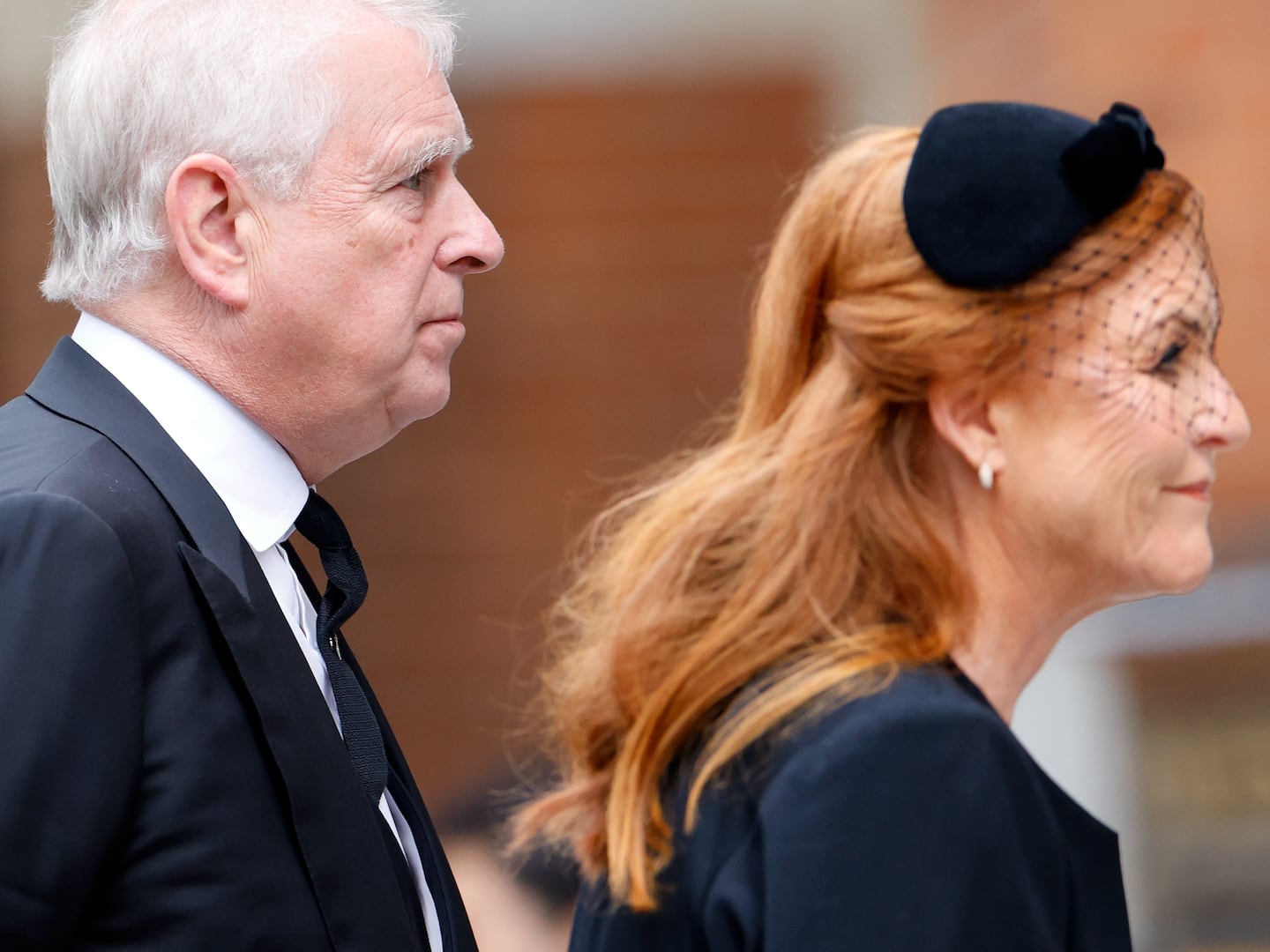The Imitation Game, the new movie in which Benedict Cumberbatch plays the prodigal computer pioneer Alan Turing, opens an uncomfortable window on the still-festering swamp of British sexual behavior. When I saw the movie in London there was a palpable frisson of disgust from the audience on learning how Turing had been treated by the country he had served with enormous distinction in World War II.
In 1952, Turing was found guilty on three counts of “gross indecency contrary to Section II of the Criminal Law Amendment Act of 1885”—a law that had its first sensational effect in the trial of Oscar Wilde. Turing had not contested the charges—he gave an explicitly detailed admission of them. He had invited a 19-year-old drifter named Arnold Murray to his house and they had had consensual sex.
Murray had not made a complaint—Turing had triggered a police investigation himself by reporting a petty burglary at his house that, it transpired, had been carried out by an acquaintance of Murray’s. The stolen items included a shirt, some fish knives, a pair of trousers, shoes, shavers, a compass, and an open bottle of sherry.
The movie resorts to dramatic license to complicate these events, suggesting vindictive police action, driven partly by working-class resentment at the libertine ways of a university professor and partly by a primitive view of sexual predilections. But the police did not need to entrap Turing. He expected truth in others and could not withhold the truth about himself.
This lack of guile distressed his friends, some of them far better than he at managing their gay lives by the subtle rules of their intellectual milieu rather than risking random encounters with proles.
Turing was given the choice of either prison or submitting himself to the officially mandated nostrum of the day: “cure” by what Turing himself described as “organo-therapy,” chemicals believed to turn homosexuals into heterosexuals. He was prescribed a course of hormone pills that caused him to grow breasts and rendered him impotent.
I realized that the effect of this barbarity on the movie audience around me was a measure of how distant the world of such a moral regime now seems.
In 1952 a British tabloid, the Sunday Pictorial (a paper with socialist allegiance and generally thought of as socially progressive) published a series of reports under the title of Evil Men, setting out to expose the role of homosexuals in society. “Most people know there are such things—Pansies—mincing, effeminate young men who call themselves queers….” These “freaks and rarities,” it declared, were just the tip of the iceberg, a problem that was far greater than realized and the time had come to tackle it.
The paper’s solution: “What is needed is a new establishment for them…it should be a clinic rather than a prison, and these men should be sent there and kept there until they are cured.”
That views like these could be printed and regarded as the voice of public virtue was only possible in a world where there was a universal assumption of “natural” sexuality being heterosexuality. For the doctors at the Manchester Royal Infirmary who treated Turing, this belief took chemical form: if male hormones increased sexual drive, female hormones might decrease or eliminate it. In fact, the estrogen that they employed did worse than castrate the subject—it could act as a cerebral depressant.
Turing’s term of probation ended in April 1953. In the final months of his treatment, the doctors ended the course of pills and inserted an implant of hormones into one of his thighs. Correctly suspecting the effects would be lasting, Turing removed it, although by then the fundamental physical effects were irreversible. Despite the publicity the case brought to them, Turing’s employers at the University of Manchester appointed Turing a Readership in the theory of computing that guaranteed him work for at least ten years.
Nonetheless, Turing killed himself on June 7, 1954, in a deliberately prepared way, by eating a cyanide-laced apple.
Why? What follows is suggestive but not conclusive.
At no time during his ordeal was Turing able to publicly reveal the far greater secret that had framed his life since 1940. This is the story told grippingly in the movie, with the help of a performance from Cumberbatch that renders a man who was, to most of those around him, an intimidating intellect, human and vulnerable.
Every military order from the Nazi high command sent to units in the field, in the air or at sea was encrypted before transmission by a machine called Enigma, resembling a bulky typewriter, capable of billions of combinations of code. It was beyond the capacity of any human cryptologist to decipher the signals. Turing conceived and built a computer, the forerunner of all digital computations, that cracked the code.
As great as this feat was, an equally demanding test followed: to conceal from the Nazis that Enigma had been beaten. Turing and his colleagues worked out a formula that would allow the Allies to make a military response to just enough of the imminent threats to keep an advantage without blowing the real scale of their intelligence. The price of this was the need to allow the Nazis to carry out attacks that the cryptologists knew were coming but were not to be made the subject of warnings—a God-like power over life and death that, not surprisingly, gave Turing’s team nightmares.
The end credits of the movie claim that Turing’s work shortened the war by two years. This is far too exact a figure to be supported on the facts—other pressures on the Nazis like the rapid Soviet advance westwards in 1944 played a part. But there is no doubt that, in effect, Turing was the war’s most successful general, one who won every engagement and saved millions of lives.
The security services insisted that this triumph should remain secret for 50 years. And when Turing killed himself in 1954 it may well have been because in addition to the social pariah status allotted to gays another pressure had intervened in his life: banishment from work in cryptology.
In 1952, before his appearances in court, he had told a friend that the nerve center of British intelligence, GCHQ, had offered him the then unusually high sum of £5,000 a year to work for them on decrypting Soviet codes. This was at the same time that he was working at Manchester on building more powerful computers for academics and large corporations to use.
But this was also the time, as the Cold War intensified, that the intelligence services of the United States and Britain were moving into an ever-closer embrace that extends to this day.
In 1950, a U.S. Senate subcommittee had been investigating “the employment of homosexuals and other sex perverts in government.” It found “an abundance of evidence to sustain the conclusion that indulgence in acts of sex perversion weakens the moral fiber of an individual to the degree that he is not suitable for a position of responsibility.”
President Truman established the National Security Agency two years later. From the beginning the NSA needed the resources of GCHQ in Britain that had inherited the wartime skills developed by Turing’s team and were now using electronic eavesdropping effectively against the Soviets. Ironically, deploying computers for intelligence analysis obligingly removed the need for human analysts whose private behavior, according to the new strictures, rendered them vulnerable to blackmail and treachery.
Moreover, the British intelligence establishment was by no means in good standing in Washington. The defection to Russia in 1951 of two British Foreign Office officials, Guy Burgess and Donald Maclean, had cast the first light on what was to become the notorious group called the Cambridge spies, with tentacles that reached deep into British intelligence. Burgess was gay and had made no effort to conceal it. His treachery, however, had been skillfully concealed for years.
In light of this new consortium of U.S. and British intelligence interests—and the failure to detect the activities of gay Burgess—it would not have been surprising if Turing’s private life, suddenly portrayed in the primitive vocabulary of the day as “perverted,” had raised a red flag at GCHQ. Whatever the reason, in 1954 Turing found himself out in the cold as far as any future secret work was concerned.
Also, nothing was yet mitigating the “Evil Men” portrayal of homosexuals in Britain. Three months before Turing’s suicide Lord Montagu of Beaulieu, a 28-year-old socialite, and two of his friends, were charged with “indecent acts” with two young enlisted men in the Royal Air Force. The case was pursued with all the trappings of a show trial—as in Turing’s case, the inference was that the upper class had been caught exploiting the lower orders in the most importunate of ways. Montagu and his two friends were jailed.
Eventually the Montagu case could be seen as a turning point in the public attitude toward homosexuality, thanks to the effort of a new generation of activists. But in 1954 many of the people governing and administering Britain were closing ranks to defend what was essentially a 19th century moral code shaped by their experience in an elitist educational system that they all shared, the public school (in meaning the reverse of the American term, being an expensive fee-paying private system where boys were mostly boarders).
Sodomy (natively described as buggery—as in “buggers can’t be choosers”) was as ingrained as floor wax in the boarding school dormitories, although officially decried. Some of it was experimental and fleeting, some of it the discovery of the sex drive without open discussion and guidance, some of it an early intimation of homosexuality or bisexuality—and some of it was a more sinister imposition of power by older boys over younger. Future lives, careers and attitudes were being determined in this lightly regulated fever. One result, now as widely accepted as it is tendentious, is that a generation of British spies first learned how to successfully lead double lives in the dissembling of the dormitory.
Turing went to a public school, Sherborne, where he developed a crush on a boy named Christopher Morcom—like Turing, Morcom was something of a loner because of his daunting intellect. The Imitation Game handles this relationship with great subtlety and Morcom’s early death, from bovine tuberculosis, is shown as the tragedy it was for Turing.
Even though reform of the law was coming, there was one persistent strain in the culture that influenced generations of British administrators and lawmakers—an inability (or reluctance) to distinguish between homosexuality and pederasty. The most aggressive and predatory of the “prefect class” in the public school dormitories carried their habits into adult life and have, for generations, apparently found it relatively easy to cover their tracks.
Only two weeks ago I watched a report on the main BBC news channel in London that brought new revelations about a case currently under investigation by Scotland Yard. Of several sexual scandals under investigation in Britain, this is the one potentially to go nuclear. The outline is already clear: During the 1970s and 1980s a highly organized pedophile ring operated at the heart of London’s ruling class.
The BBC interviewed a man whose identity was concealed who alleged that the ring included senior members of the government, military, law enforcement, and judiciary. More explosively, he alleged that at least one murder of a young boy had taken place in the course of the ring’s activities. The base of the ring’s operations is said to have been a sprawling apartment complex called Dolphin Square, very close to both Parliament and government ministries.
Scotland Yard did not deny that these allegations were part of their investigation. But, as is often the case, what may be equally as damning as the crime will be the cover-up. This ring, it would appear, was not only organized but institutionalized—safely and impregnably institutionalized to the extent that its members occupied positions of power in the very places where normally investigations would have been instigated, effectively discouraging or suppressing whistleblowers.
And—does this sound familiar?—there is a missing dossier. In 1983 the then Home Secretary in the Thatcher government, Leon Brittan, was given a 40-page dossier listing many of the prominent figures said to be involved in the pedophile ring. Recently, when whistleblowers finally surfaced, the Home Office officials could find no trace of the dossier. Nor could they find 114 files related to another investigation of child abuse between 1979 and 1999.
You don’t need to be the writer of a paranoid political thriller like House of Cards to imagine the conspiracy behind the disappearing files. Cabinet ministers of the day gather to review the names and the allegations. Somebody suggests that if proved they could seriously damage public confidence in the state, posing a national security risk. Somebody else suggests that the evidence is precarious, coming as it does from victims who might not make confident witnesses. Why not let the whole thing quietly fade away for want of a diligent investigation? Bureaucratic inertia is, by long tradition, the most efficient dispatcher of scandals.
All this follows what is, in terms of a society turning a blind eye to outrageous behavior, the most egregious case of all, that of the TV entertainer Jimmy Savile who, over the course of 50 years, it is now reckoned, abused more than 500 underage boys and girls, the youngest being two years old—as well as practicing necrophilia in a large hospital where he was able to roam freely.
In Britain, the state has been a very poor custodian of children vulnerable to sexual predators. This should also be an indictment of the national media. If a fraction of the resources devoted to pursuing drivel about celebrities had instead been spent on following up persistent rumors of widespread child abuse by the likes of Savile (including by the BBC in whose lax regime he had flourished) a great deal of appalling and permanent hurt could have been avoided.
There is, however, one unsung hero to this otherwise tawdry story. In 1957, three years after Alan Turing’s suicide, a body called the Committee on Homosexuality and Prostitution (formed, in part, because of the trial of Lord Montagu) made public its recommendations in what was called the Wolfenden Report, named for the chairman of the committee, Sir John Wolfenden.
The committee had been informed by—and influenced by—the two reports issued in the U.S. by Dr. Alfred Kinsey, the first in 1948 on sexual behavior of the human male, the second in 1953 on the human female. (The explicitness and candor of the Kinsey reports and their clinical experimentation were so alarming to some public librarians in Britain that citizens could only see them after making individual requests and being screened.)
Wolfenden was an academic and seen by the establishment as a “safe pair of hands.” When he was appointed few expected that he would be able to guide his committee to a radical conclusion but he did. The committee recommended a single—and simple—principle be applied to the law, that of consent. Consensual sex between males in private should be decriminalized. (Sex between women had never been criminalized, so there was no need for a new law to include them.)
It took another ten years for the Wolfenden recommendations to become law. They were finally accepted by a Labour Home Secretary, Roy Jenkins, in 1967. This was, after all, the Swinging Sixties in London and the country had moved on. But the reform had come too late for Wolfenden’s son, Jeremy, who was gay. He died in 1965 while serving as the Washington correspondent of the Daily Telegraph—according to his friends, the strains of the double life had been too much and he drank himself to death, joining Alan Turing in the long list of casualties of a repressive, vindictive and monstrously hypocritical regime.






